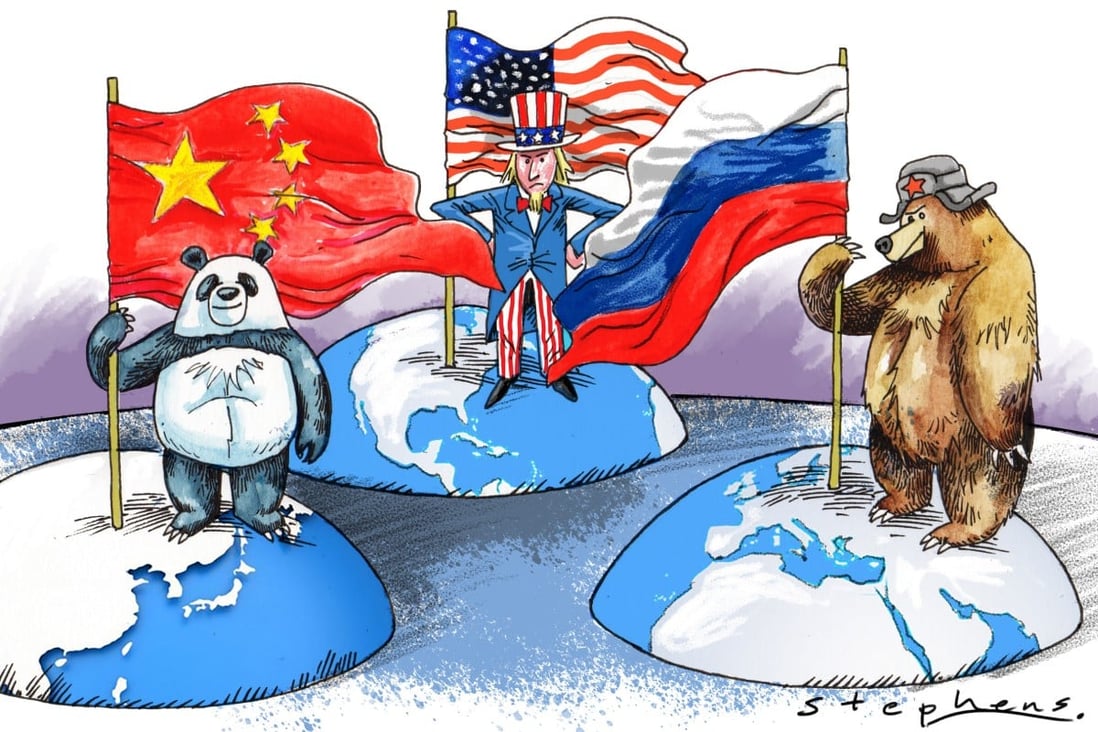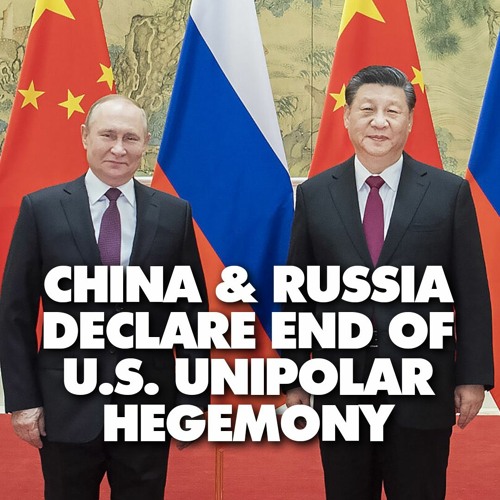
For Russia-China, Multipolarity Is
All about (Usurping) the Benjamins
Ted Snider / The Quincy Institute for Responsible Statecraft
(April 19, 2023) — Beijing and Moscow have been very busy places lately. In the past few weeks, Putin and Xi have welcomed not just each other but representatives from France, Brazil, and more than 40 African countries. They have also been hosting negotiations between Saudi Arabia and Iran as well as Saudi Arabia and Syria.
This “unusual pace of diplomatic activity,” as CNN referred to China’s schedule, is suggestive of a new world with many poles that wants to replace the US-led unipolar order. Russian and Chinese officials, including leaders Vladimir Putin and Xi Jinping, repeat at every opportunity that their strategic partnership and vision doesn’t hew to blocs or alignment against third countries. Rather, they call for “multipolarity,” in which many poles — large and small — have agency, starting with upending the supremacy of the US dollar.
That was the theme of a recent conference in Moscow called “Russia-Africa in a Multipolar World.” Some 40 countries — including Congo, Benin, Burkina Faso, Guinea, Guinea-Bissau, Zimbabwe, Mali, and South Africa (which, along with China and Russia, is a BRICS member) — joined Putin in that call for multipolarity.
On the same day that Russia was hosting the representatives from Africa, Putin was meeting Chinese President Xi Jinping in Moscow. Their discussion would set the pattern for the flurry of diplomatic meetings that would follow.
In his greeting to Xi on March 20, Putin pointed out that trade between China and Russia has grown to $185 billion a year. In his article for the Chinese People’s Daily Newspaper, Putin said “the share of settlements in national currencies” of all that trade “is growing.”
In that article, the Russian president, whose country is operating under global economic sanctions as a result of its invasion of Ukraine last year, again stressed that Russia and China advocate “the shaping of a more just multipolar world” through the promotion of “democratic multilateral structures such as the SCO (Shanghai Cooperation Organization) and BRICS.”
In Xi’s companion piece in the Russian media, he too advocated the idea of a multipolar world, in which “no country is superior to others . . . and no single country should dictate the international order.”

In their joint statement after their talks, Putin pointed again to circumventing the dollar as a step toward these goals: “the share of the ruble and yuan in mutual commercial transactions reached 65 percent and continues to grow, which allows us to protect mutual trade from the influence of third countries.”
Three weeks later, French President Emmanuel Macron travelled to Beijing for talks with Xi. Their talks demonstrated the same thematic pattern.
After their meeting, Xi said that Europe is an “independent pole in a multipolar world.” That the Chinese leader should make such a statement is not surprising. That a major American European and NATO ally should sign on to it is. The joint declaration issued by Xi and Macron following their talks declares that “They seek to strengthen the multilateral international system under the aegis of the United Nations, in a multipolar world.”
Macron would repeat this point again in an interview on board his plane returning from China. Macron said that Europe must achieve “strategic autonomy” and become a “third superpower.” He advocated for a Europe that is not a junior partner in a US-led unipolar world but for a Europe that “can be the third pole.”
Macron arrived in Beijing with an entourage of about 50 French business executives, including the chief executives of Airbus (which just sold 160 aircraft to a Chinese company) and the French electricity company EDF. But perhaps more importantly, Macron echoed Xi and Putin, calling on Europe to reduce its dependency on the “extraterritoriality of the US dollar.”
One week after Macron flew out of Beijing, Brazilian President Luiz Inacio Lula da Silva flew in. Like Macron, he arrived with a huge entourage of business executives. Accompanied by 240 business representatives, Lula and Xi signed several agreements on trade and investment.
Again the multipolar world featured prominently in Xi’s statement, saying that “China and Brazil are resolved to . . . practice true multilateralism [and to] work for a more just and equitable international governance system.”
Lula stressed that “[t]he two sides both uphold multilateralism” and promised that “Brazil stands ready to work with China to strengthen strategic coordination in . . . BRICS and other multilateral institutions.”

Lula then joined China, Russia, and France in linking trade to multipolarity with a plea for emancipation from the monopoly of the US dollar. “Why should every country have to be tied to the dollar for trade?” he asked. “Who decided the dollar would be the [world’s] currency?” In March, Brazil and China each named one bank to conduct their bilateral trade in the Brazilian real and the Chinese yuan.
Lula was critical of the IMF for “asphyxiating countries’ economies the way the IMF is doing now with Argentina, or the way they did with Brazil for a long time and every third-world country.” He offered the alternative of multipolar organizations like BRICS. “Why can’t a bank like the BRICS bank have a currency to finance trade between . . . BRICS countries?”
The recent flurry of diplomatic activity in Beijing and Moscow suggests that China and Russia are encouraging the strengthening of many poles in Asia, Eurasia, Europe, Latin America, and Africa. A pattern has emerged in those conversations of sometimes surprising support both for multipolarity and for circumventing the monopoly of the dollar in support of that goal.
Posted in accordance with Title 17, Section 107, US Code, for noncommercial, educational purposes.